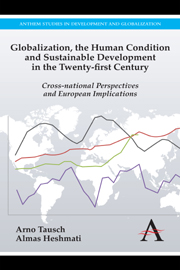 Globalization, the Human Condition and Sustainable Development in the Twenty-First Century
Globalization, the Human Condition and Sustainable Development in the Twenty-First Century Book contents
- Frontmatter
- Contents
- Miscellaneous frontmatter
- List of Abbreviations
- Glossary of Key Terms
- Foreword
- Preface
- 1 Should the Musicians Continue to Play?
- 2 Background
- 3 Methods
- 4 Cross-national Results: Beyond the Pro-globalist Development Approach of the European Commission
- 5 Final Cross-national Results for the Combined Development Indicator
- 6 A Time Series Perspective on Globalization, Growth and Inequality
- 7 Conclusions
- Appendices
- References
- Index of Persons and Authorships
- Index of Subjects and Countries
5 - Final Cross-national Results for the Combined Development Indicator
Published online by Cambridge University Press: 05 July 2012
- Frontmatter
- Contents
- Miscellaneous frontmatter
- List of Abbreviations
- Glossary of Key Terms
- Foreword
- Preface
- 1 Should the Musicians Continue to Play?
- 2 Background
- 3 Methods
- 4 Cross-national Results: Beyond the Pro-globalist Development Approach of the European Commission
- 5 Final Cross-national Results for the Combined Development Indicator
- 6 A Time Series Perspective on Globalization, Growth and Inequality
- 7 Conclusions
- Appendices
- References
- Index of Persons and Authorships
- Index of Subjects and Countries
Summary
To arrive at informed opinions about the combined effects of our 26 predictor variables on the totality of the reduced list of 30 or extended list of 35 dependent variables, measuring ‘development’, we have to use multivariate or multi-dimensional index construction. As we mentioned in Chapter 3, the performances of all the countries of our investigation for all the dependent variables were standardized along a scale, ranging from 0 (worst value) to 1 (best value). The chosen variables correspond to seven different dimensions and interact with one another (see also Table 3).
Democracy
Economic growth
Environment
Gender
Human development
R&D
Social cohesion
The performance scores, calculated according to the well-known UNDP index practice, described in Chapter 3, can be now combined into a single index, based on our extended list of 35 dependent variables, or they can be first grouped into seven different dimensions, and only then added together. Such a grouping together of the performance results can be interesting, especially in order to judge whether or not the seven different policy dimensions of the presumed, measured phenomenon ‘EU-2020 policy performance’ correlate strongly and positively with one another.
In an ideal world, democracy, growth, environment, gender equality, human development, research and development and social cohesion all correlate very strongly and positively with one another. Of course, the EU decision makers assumed such neat and positive correlations at least implicitly all along the failed Lisbon Strategy from 2000 to 2010, and they committed this erroneous assumption anew for the EU-2020 process.
Information
- Type
- Chapter
- Information
- Globalization, the Human Condition and Sustainable Development in the Twenty-First CenturyCross-National Perspectives and European Implications, pp. 123 - 138Publisher: Anthem PressPrint publication year: 2012